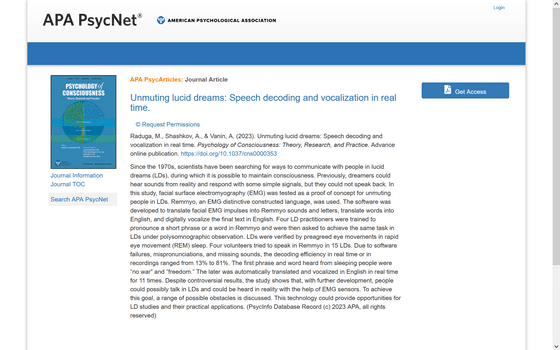A 'language' has been developed to communicate with sleeping people

Humans repeat “REM sleep” in which the brain is activated during sleep and “non-REM sleep” in which the brain rests. Focusing on REM sleep, which is said to be a dream during which the brain moves actively, research institutes are working to develop a ``language'' for sleeping people to communicate with awake people.
Unmuting lucid dreams: Speech decoding and vocalization in real time.

“Sleep language” could enable communication during lucid dreams | Ars Technica

Some humans are able to realize that they are dreaming while they are dreaming. Some of these dreamers, called ' lucid dreamers ,' are able to change the content of their dreams at will, so the Phase Research Center suggests that lucid dreamers can train specific muscles. I thought of moving it.

Michael Laduga, CEO of Phase Research Center, devised a mechanism to convey his intention by matching specific words to facial muscles and moving facial muscles. As a result of sharing this with the participants of the experiment and having them learn it, they became able to communicate while they were awake. This mechanism that substitutes muscle movement for language is named 'Remmyo'.
Participants were then asked to fall asleep with an EMG sensor and to move their facial muscles while having a lucid dream. ``People who are lucid dreamers can transfer information in words of three letters or less,'' Laduga argues. The results of the experiment were expected.

However, the results were uncertain. When the planned phrase was translated into the language, it turned out that the accuracy was 13 to 81%. ``The main problem is that it's hard for people to use just one facial muscle,'' Laduga said. It is.” In addition, the words uttered by the sleeping person were 'no war' and 'freedom', and the latter was said to have been issued a total of 11 times.
The results are published in the academic journal Psychology of Consciousness. Mr. Laduga said, ``Currently, we are translating only with handwritten algorithms, but in the future we will use machine learning and AI to improve accuracy.By improving the translation method in the future, the results will be more stable. I look forward to it,' he said.
Related Posts:
in Science, Posted by log1p_kr







